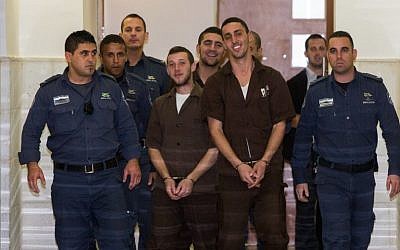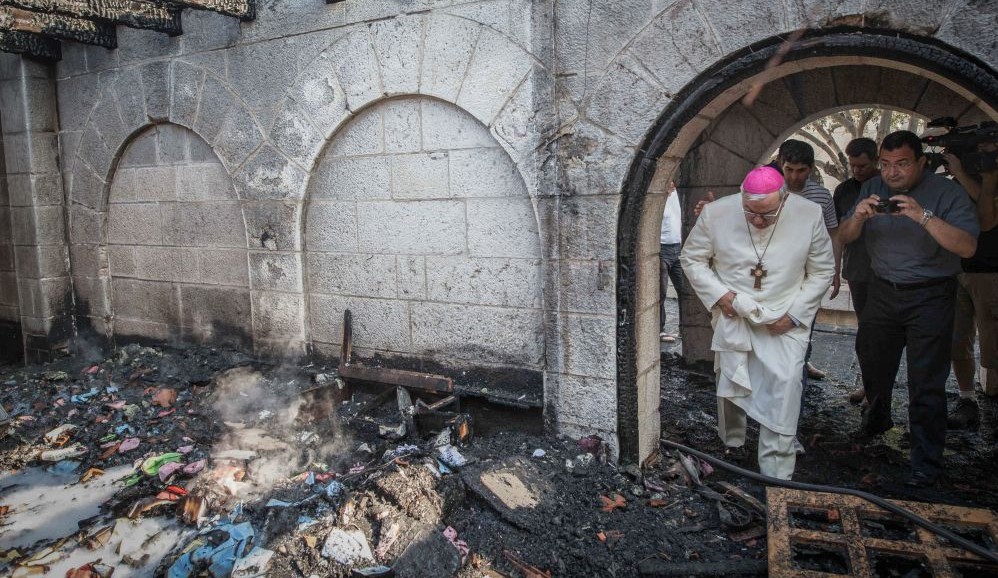Member of Israeli Knesset Suggests Burning of Churches and Christian Holy Sites in Israel.
Radical Zionists have taken control of Israel. For fourteen hundred years, the most sacred Christian Holy Sites have been protected, not by the West or Jews, but by the Arab Muslims with whom the Patriarch of Jerusalem agreed to their protection when the Muslims first invaded Jerusalem and "the Holy Land." Till this present time, the Christian Holy Sites have been protected from radical Jews by the Muslim Authorities. East Jerusalem is under the authority of the Palestinians. The radical Jews who have taken control of the Israeli Government are an existential threat to these sites and are threatening to destroy them. They have been on a campaign of burning Churches in Israel. And this week, a member of the Israeli Knesset suggested burning Christian Churches and Holy Sites. This hostility towards Christians has been steadily increasing for some time. The Patriarch of Jerusalem just published a statement that they are under threat from radical Zionist Jews.
Radical Jewish group’s head advocates burning churches
The head of an extreme right-wing Israeli group opposed to Jewish-Arab integration on Tuesday advocated the burning of mosques and churches in Israel at a public forum.
Lehava chairman Bentzi Gopshtain took part in a panel debating Jewish religious law Tuesday night alongside Rabbi Moshe Klein, rabbi of the Hadassah Hospitals; Tsuriel Krispal, deputy mayor of Elad; and Benny Rabinovitch, a writer for the ultra-Orthodox paper Yated Ne’eman.
Gopshtain’s remarks came against the backdrop an arson incident at the Church of the Multiplication of the Loaves and Fishes on the shore of the Sea of Galilee in June. Police arrested three Jewish suspects believed involved in the attack, some of whom were implicated in previous attacks on Christian sites in Israel.
During the debate, Rabinovitch asked Gopshtain point blank whether he advocated the burning of churches, according to a recording of the debate published Wednesday by the ultra-Orthodox news site Kikar Hashabat.
“Maimonides…” Gopshtain started, apparently alluding to the rulings of the 12th century Jewish sage, “you must burn [churches], are you against Maimonides or in favor of Maimonides?”
“Don’t tell me about Maimonides, I asked you what you say,” Rabinovitch replied.
“Of course I am,” Gopshtain said.
In December, following the torching of a Jewish-Arab school in Jerusalem and his arrest on suspicion of inciting terrorism, Gopshtain said his organization does not act illegally and accused the Shin Bet security service of trying to frame Lehava to thwart its “holy work of saving the daughters of Israel.” In July, members of Lehava were convicted in the attack on the school.
Three members of the anti-assimilation Lehava organization, suspects in an arson attack on a Jewish-Arab school, are brought to a hearing at the District Court in Jerusalem on December 15, 2014. (photo credit: Yonatan Sindel/Flash90)
Earlier this week, an internal Shin Bet security service report concluded there was insufficient evidence to blacklist Lehava. The report came as a blow to Defense Minister Moshe Ya’alon’s efforts, with the security agency and legal experts, to build a case for banning the organization.
Lehava opposes homosexuality and the assimilation of Jews, and activists regularly rally against personal or business relationships between Jews and non-Jews, including outside weddings between Jews and Arabs.
“The conclusion at this stage is that there is insufficient evidence to declare the organization illegal,” the Shin Bet told Haaretz in a statement Tuesday. According to the report, the security agency said it would reconsider its assessment if new evidence against the nationalist group emerges.
The Shin Bet’s report came out amid a crackdown on Jewish extremist groups following last week’s firebombing of a Palestinian home near Nablus, in which a year-old baby was killed and his parents and brother were critically wounded. Three extremists suspected of involvement in Jewish terrorist activity targeting Palestinians were placed under administrative detention — imprisonment without trial — in the wake of the attack.
A priest inspects the damage caused to the Church of the Multiplication at Tabgha, on the Sea of Galilee, in northern Israel, which was set on fire in what police suspect was an arson attack, June 18, 2015. (Basel Awidat/Flash90)
On Monday, Ya’alon vowed to lead an “uncompromising” fight against Jewish terrorism, after the firebombing of the Dawabsheh home near Nablus and the stabbing by an ultra-Orthodox extremist at the Jerusalem Gay Pride Parade which left one dead and five others injured.
Later in the panel conversation, Klein, the head rabbi of Hadassah, addressed Gopshtain, saying, “Benzi, just now they filmed and recorded you, and [if] that reaches the police you’ll be arrested.”
“That’s the last thing that bothers me,” Gopshtain can be heard saying. “If that’s the truth then I’m prepared to sit 50 years in prison for it.”
Gopshtain responded to reports that he advocated burning churches by saying, “The law is straightforward, Maimonides’ interpretation is that one must burn idolatry. There’s not a single rabbi that would deliberate that fact. I expect the government of Israel to carry that out.”
He told Kikar Hashabat, “I said that for speaking the truth, I am prepared to sit in prison. And I emphasized that I don’t burn and won’t go and burn churches.”
Is our live war coverage important to you?
Are you relying on The Times of Israel for accurate and timely coverage right now? If so, please join The Times of Israel Community. For as little as $6/month, you will:
- Support our independent journalists who are working around the clock;
- Read ToI with a clean, ads-free experience on our site, apps and emails; and
- Gain access to exclusive content shared only with the ToI Community, including exclusive webinars with our reporters and weekly letters from founding editor David Horovitz.
Join the Times of Israel Community Join our Community Already a member? Sign in to stop seeing this
Christians are at risk of being driven out of the Holy Land | Patriarch Theophilos III
Today, 7 January, is Christmas, according to the Orthodox Christian calendar. And Orthodox Christians are keeping the feast in the Holy Land, where Christmas – and Christianity – began.
Much attention has been paid recently to political decisions recognising Jerusalem in one light or another. The media attention highlights the seemingly intractable political struggle here. But as well as the threat to the political status quo, there is a threat also to the religious status quo, a threat instigated by radical settlers in and around Jerusalem, the heart of Christianity. And one group that has always been a pillar of society in the Holy Land – Christians – seems to have been rendered invisible in this standoff.
Christians have lived a history in the Holy Land that spans more than two millennia. We have survived countless invasions, and have flourished under many different forms of government. We know that our survival has depended on the principle that the holy places must be shared by and be accessible to all. For it is the holy places that have given meaning to the region for both inhabitants and conquerors of all faiths. The protection and accessibility of the holy places are understood through a set of rules called the “status quo”, which has been followed by all religious and governmental authorities of the region through the ages.
When the successor of the prophet Muhammad, Caliph Omar ibn al-Khattab, invaded Jerusalem in 637, he was greeted by Patriarch Sophronios, the then ethno-religious leader of Jerusalem. Together they signed a covenant that paved the way for an era of peace. This covenant was based on an understanding of shared custodianship of the holy places.
Now various sides want to claim the Holy Land, including Jerusalem, as the exclusive possession of only one people. This treats with contempt the mechanism that has maintained peace and our multi-religious landscape for generations.
Jerusalem is a sacred gift, hallowed ground, for the entire world. Attempts to possess the holy city, or to define it in terms of exclusivity, will betray its true nature.
Recently Christian communities from the Holy Land came to the UK to seek support for our plight in the face of legal and land threats to the Christian church in the Holy Land. We were moved that church leaders from across the UK came to our support. In meetings with Prince Charles and government ministers, as well as with church leaders, we highlighted a proposed “church lands” bill signed by 40 members of Israel’s Knesset that would restrict the rights of churches to deal independently with their own land. We also discussed threats to church land around the Jaffa gate of the Old City of Jerusalem.
The UK’s Catholic Cardinal Vincent Nichols summed up the view of many when he told us that the proposed bill represented “an intolerable infringement of the status quo and the legitimate rights of the churches, and should be recognised for what it is: an attack on the property rights of the Christian community”.
In addition to the church lands bill, one of the foremost threats to Christians in the Holy Land is the unacceptable activities of radical settler groups, which are attempting to establish control over properties around the Jaffa gate. The properties in question are in the heart of Jerusalem’s Christian quarter, the seat of all the patriarchates and headquarters of the churches, and less than 500m from the Church of the Holy Sepulchre.
The Patriarchate has lodged an appeal with the Israeli high court of justice, but if our efforts prove unsuccessful the result would be immensely damaging to the integrity of the Old City. If the settler groups were to gain control of the properties, they would be able to pursue their aggressive campaign of removing non-Jews from the City and from these strategic centres at the heart of the Christian quarter, threatening the very presence of Christians in the Holy Land.
The Christian understanding of holy places is that all people have claims to the sanctity of their holy places, because holiness is a divine characteristic, not a human one. No party should ever be able to make an exclusive claim over a holy place – in this case, over the holy city of Jerusalem.
We shall continue the fight for this cause because it is right and because it is our basic pastoral duty.



Comments
Post a Comment